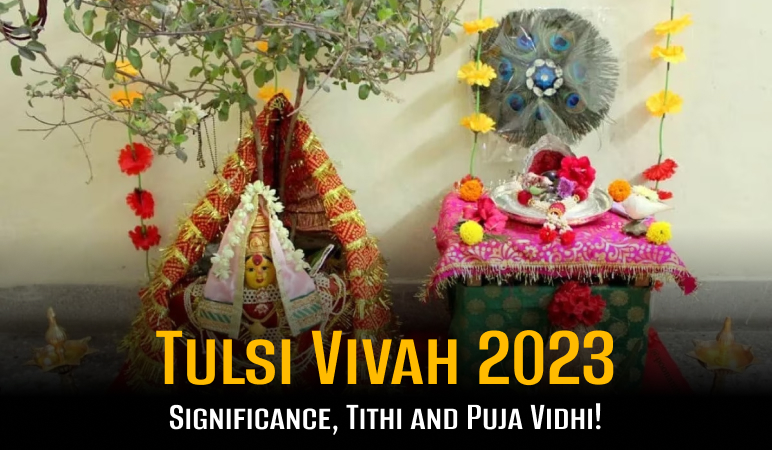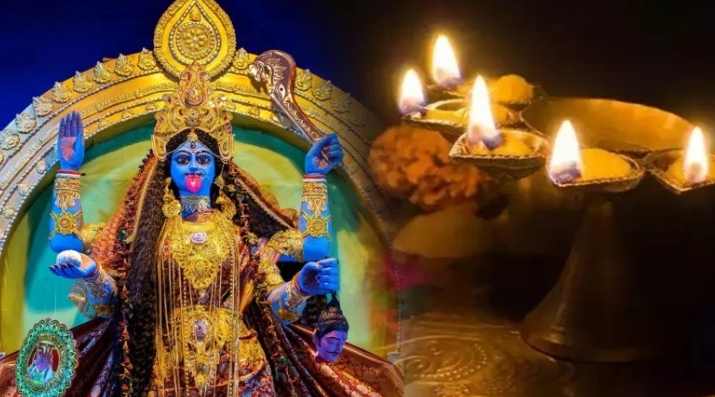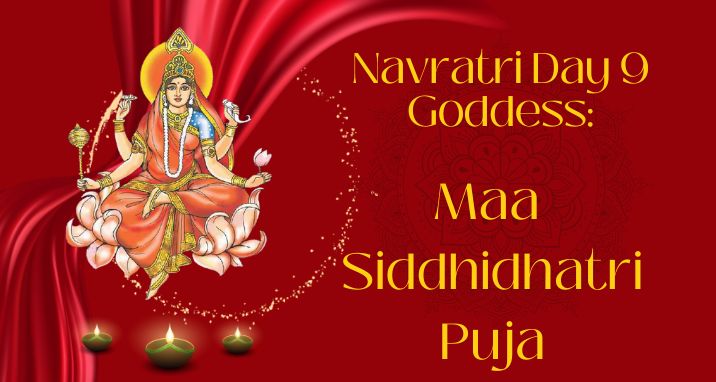Tulsi Vivah 2023: Significance, Tithi and Puja Vidhi!

In Sanatan Hindu dharma, many plants and trees are considered sacred, out of which Tulsi (holy basil) is one of the most revered holy plants among Sanatan Hindus. Tulsi or Tulsi Mata is believed to be the incarnation of Maa Lakshmi, the divine consort of Bhagwan Vishnu and its leaves are essential in the worship of Shri Hari Vishnu and all his avatars.
It is a tradition in Sanatan Hindu houses to place Tulsi plant manch (elevated platform with a space to plant Tulsi) in the middle of the house or courtyard, or towards the northeast corner facing the house. Tulsi has several medicinal properties and has been used for medical purposes in India since ancient times. It is also consumed in many other forms in Indian households. Moreover, Tulsi exudes spiritual energy and also purifies the air of the place where it resides. It is also believed to help eliminate negative energy from the house and help people get rid of bad karma. According to Puranas, wherever there is Tulsi, Bhagwan Vishnu and his avatars reside there.
What is the Significance of Tulsi Vivah?
Tulsi Vivah is considered one of the most auspicious days of Hindu religion which is dedicated to Bhagwan Vishnu and Maa Tulsi. On the day of Tulsi Vivah, Vishnu Bhagwan, the preserver of the world, is married in the form of Shaligram to Mata Tulsi in the form of a Tulsi plant. On this day, Tulsi Vivah is organised by Sanatan Hindus with great pomp and enthusiasm all over India.
According to the Hindu calendar, Tulsi Vivah is performed every year on the Dwadashi Tithi of Shukla Paksha of Kartik month. The festival of Tulsi Vivah starts from the eleventh lunar day i.e. Prabodhini Ekadashi (Dev Utthani Ekadashi) and continues till the full moon night or Kartik Purnima. In many parts of India, the festival of Tulsi Vivah is celebrated on the eleventh (Ekadashi Tithi) or twelfth lunar day (Dwadashi Tithi). According to the English calendar, this festival usually falls in October or November. On this day, there is a ritual to solemnise the marriage of Shaligram, the idol of Lord Vishnu, and Goddess Tulsi.
Tulsi Vivah signifies the beginning of the wedding season for Sanatan Hindus. It is also the time to commence all the auspicious work which were put to a halt due to Chaturmas after Dev Shayani Ekadashi.
तुलसी विवाह 2023 तिथि – शुक्रवार, 24 नवम्बर
- द्वादशी तिथि प्रारम्भ – नवम्बर 23, 2023 को 09:01 पी एम बजे
- द्वादशी तिथि समाप्त – नवम्बर 24, 2023 को 07:06 पी एम बजे
Tulasi Vivah 2023 Date: Friday, November 24
- Dwadashi Tithi Begins – 09:01 PM on Nov 23, 2023
- Dwadashi Tithi Ends – 07:06 PM on Nov 24, 2023
Rituals Associated with Tulsi Vivah
Shri Hari Vishnu and Tulsi marriage rituals are similar to the customs and traditions of a normal Hindu wedding ceremony which can be performed both in the temple and at home.
- People keep fast on the day of Tulasi Vivah, which is broken after the puja is over.
- A beautiful mandap is built for this marriage, just like any other Hindu weddings are organised.
- After giving a bath to the Tulsi plant and the idol of Bhagwan Vishnu, the entire place and both Mata Tulasi and Vishu Bhagwan are bedecked with garlands and flowers.
- Mata Tulasi is draped in a beautiful red saree and adorned with jewellery, bindi and ornaments for this day, just like a Hindu bride.
- The Shaligram Sheela (the Sheela form of Bhagwan Vishnu) is draped in a traditional dhoti for the occasion.
- Afterwards, the red sacred thread is used to marry the couple and solemnise the ceremony.
- Any age of women can participate in this ceremony, married or unmarried.
- In the end, sindoor and rice are showered on all newlywed couples. This is done by all devotees present there.
- Finally, prasad is distributed among all devotees.
Story Behind the Marriage of Tulsi and Shaligram
According to the Sanatan Hindu scriptures and beliefs, in ancient times there used to be a demon named Jalandhar who was creating havoc all around. Jalandhar was very brave and valiant and the secret of his bravery was the devotion of his wife Vrinda. Jalandhar was able to become so brave only due to the influence of his wife’s fast (Vrat), who was a great Vishnu devotee. In such a situation, troubled by his terror and atrocities, the gods appealed to Lord Vishnu for help. Hearing the prayers of all the gods, Shri Hari Vishnu decided to break Vrinda’s dharma of chastity.
So, Bhagwan Vishnu took the form of Jalandhar and deceitfully touched Vrinda. The demon Jalandhar was fighting bravely, but as soon as Vrinda’s chastity was violated, he was killed in the battle. Jalandhar’s severed head fell into her courtyard. Seeing this, Vrinda became angry. She thought that if my husband was not here then who touched her? At that time Vrinda found Lord Vishnu standing in front of her, at that time in anger Vrinda cursed Lord Vishnu, ‘Just as you have given me separation from my husband by deceit, in the same way, your wife will also be taken away by deceit and you will have to bear the separation from your wife, by taking birth in this mortal world.’
After saying this, Vrinda committed sati with her husband. It is said that due to the curse of Vrinda, Lord Shri Ram took birth in Ayodhya and had to bear the separation from Mata Sita. Tulsi plant grew at the place where Vrinda committed Sati.
Importance of Tulsi Vivah
Tulsi Vivah day holds special significance in Sanatan Dharma and this date marks the beginning of the Hindu wedding season in India. Tulsi Vivah day falls just a day after (on Dwadashi) Devuthani Ekadashi. In many places, it is celebrated on the same day. On the day of Devuthani Ekadashi, Lord Vishnu wakes up after four months of yoga nidra (yogic sleep). According to Hindu scriptures, doing any kind of auspicious and auspicious work is prohibited in these four months i.e. Chaturmas. Auspicious works begin with Devuthani Ekadashi or Tulsi Vivah. Organising Tulsi Vivah on this day proves to be very auspicious and auspicious.
It is believed that people who organise Tulsi Vivah and Puja in their homes get rid of all the troubles and adversities in their lives. Their sorrows come to an end and wealth starts increasing. If you feel that negative energy inside your house, then consider organising Tulsi Vivah in your house. Performing Yagya and reciting the story of Satyanarayan on the day of Tulsi Vivah also gives special benefits.
The festival of Tulsi Vivah is organised to celebrate the marriage of Shri Hari Vishnu to the Tulsi plant, also said to be the incarnation of Goddess Lakshmi. This festival is celebrated between Prabodhini Ekadashi and Kartik Purnima. Married women do the fast and puja of Tulsi Vivah for a happy married life and the welfare of their husbands and children, similarly, it is done by unmarried girls to get a suitable groom.
For more insights, you can consult our pandits and astrologers here.









